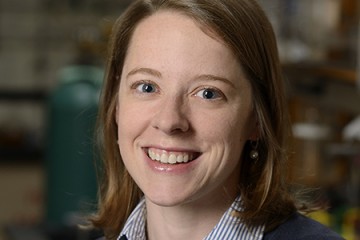Muyinatu Bell, an assistant professor in Johns Hopkins University's Department of Electrical and Computer Engineering with a joint appointment in Biomedical Engineering, has been named a Sloan Research Fellow for 2019.
The two-year fellowship, awarded annually since 1955 by the Alfred P. Sloan Foundation, recognizes early career scientists who show promise in making significant contributions to their fields—chemistry, computer science, economics, mathematics, computational and evolutionary molecular biology, neuroscience, ocean sciences, or physics. The honor, presented this year to 126 scientists from the U.S. and Canada, is accompanied by a $70,000 award.
Bell received the award in physics for her work in photoacoustic imaging, a form of ultrasound imaging that mixes sound, light, and robotic technology to enhance medical imaging. She recently founded the Photoacoustic and Ultrasonic Systems Engineering Lab, also known as the PULSE Lab.
In the past year, she has been named a Top Young Innovator by MIT, received the Trailblazer Award from NIH, and earned a National Science Foundation Early CAREER Award.
Ralph Etienne-Cummings, chairman of the Department of Electrical and Computer Engineering, nominated Bell for the fellowship. He described her as one of the rising stars of the department.
"In her young career, she has made some significant contributions in the field of photoacoustic imaging and guidance for surgical tools," he said. "This is a well deserved recognition of what she has accomplished, and also a recognition of her potential to do great things in the future."
With the fellowship award, Bell will begin work to define safety limits for photoacoustic-guided surgery. In photoacoustic imaging, lasers are used to generate sound waves from structures that absorb their light. Currently safety limits for lasers interacting with human tissue are defined for skin and eye tissue. This project will help determine safe limits of laser use on liver and pancreatic tissues, which have significantly different optical and thermal properties than skin.
Once these safety limits are determined, photoacoustic imaging will give surgeons real-time views of major blood vessels hidden by tissue and of surgical tools, with the best possible image quality for this photoacoustic-guided surgery approach.
"This is a really exciting field with a lot of different research avenues to explore in order to bring the technology to our end users," Bell said. "I believe that this idea will transform the surgical landscape as we know it today. It will also open up new research directions for other types of optical-based imaging methods that require lasers in direct contact with tissues other than skin or eyes."
Sloan Research Fellows, nominated for the award by their fellow scientists, are selected for their potential to become leaders in their respective fields. Fellows have gone on to win 45 Nobel Prizes and 69 National Medals of Science.
Posted in Science+Technology, University News
Tagged muyinatu bell










